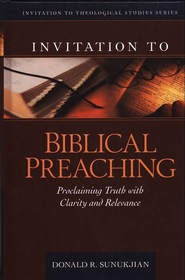Donald Sunukjian: Invitation To Biblical Preaching
 Donald R. Sunukjian, Invitation To Biblical Preaching: Proclaiming Truth with Clarity and Relevance (Grand Rapids: Kregel Academic & Professional, 2007), 375 pages, ISBN 9780825436666.
Donald R. Sunukjian, Invitation To Biblical Preaching: Proclaiming Truth with Clarity and Relevance (Grand Rapids: Kregel Academic & Professional, 2007), 375 pages, ISBN 9780825436666.
This book is about the application of the Biblical text—moving from the Biblical text to where people live today, “the take home truth.” This book is very good on pulpit speech and will benefit every minister. While the writer is more qualified as a communication specialist than a homiletican, I do plan to use his suggestions and thoughts on pulpit speech.
Sunukjian assumes the Biblical text is accurate and tries to make it relevant. He is well read on various methodologies of preaching but has problems including other theories of preaching into his writing. For example, he looks at blocks of thoughts in a narrative but outlines it inductively and deductively, instead of letting the blocks of thoughts form the outline of the sermon without a proposition.
The second section of the book, “Look on what God is saying …to us,” deals with pulpit speech and making the sermon flow. Sunukjian says application is taking the central truth and applying it to the audience, applying the take home truth to all age groups. He suggests that after each major point the sermon should have a transitional rhetorical question. The minister should introduce the sermon by summarizing the text before he preaches the sermon.
I like what Sunukjian says about the conclusion of the sermon: “End positively on a note of encouragement and hope” (251). Such a conclusion gives hope in a hopeless world; real hope rooted in the resurrection of Jesus.
His chapter on oral clarity suggests writing the way you talk, using the active voice rather than the passive and verbs rather than nouns, and using simple and similar words.

Donald R. Sunukjian is Professor of Homiletics, Christian Ministry and Leadership at Talbot School of Theology.
The chapter on “Deliver with freedom” suggests we should emphasize the take home truth of the sermon that speaks to the needs of people. Preach without notes and use a small pulpit or a music stand. He suggests that if you write out your sermon in a manuscript, memorize your main points you will speak more clearly. “And you find that 80-90 percent of the words you wrote easily come to mind as you speak” (302).
Preachers that will benefit the most from this book are those who outline sermons propositionally. I have problems with propositional preaching because it uses a foreign methodology (to the biblical text) as a pre-supposition to interpret the Biblical text. Although Sunukjian seeks to make propositional preaching simpler, the methodology itself is the problem. Any sermon that uses the propositional method as a pre-supposition to interpret the Biblical text forces the text to say and do what things the author of the text never intended. Propositional preaching works against the ethos of the Pentecostalism.
Category: Ministry, Winter 2009


